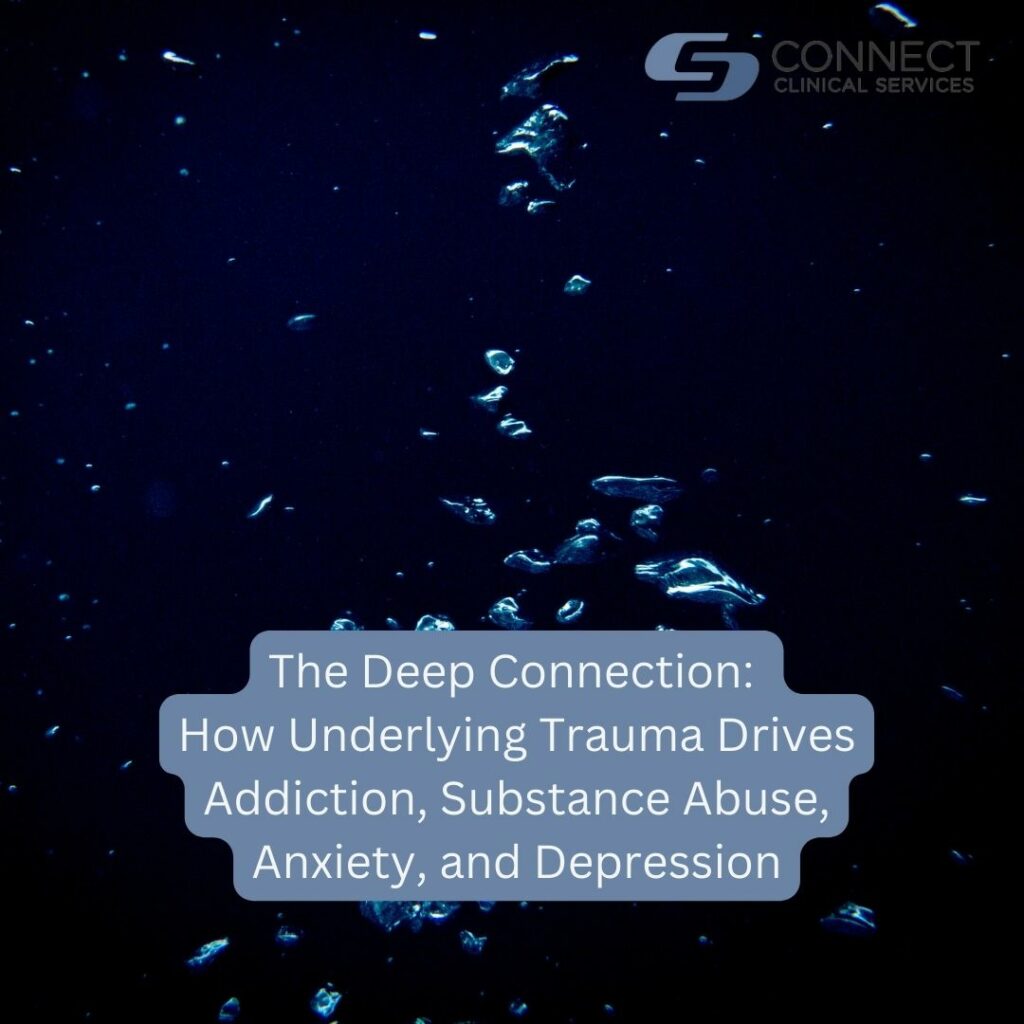4 Reasons Trauma Therapy In Houston Is Effective And Works

Is Trauma Therapy In Houston Effective?
Effective trauma therapy in Houston can make a positive and lasting impact on your mental health. The intricate relationship between trauma and mental health conditions is a subject of growing interest and importance in psychology and psychiatry. Underlying trauma can profoundly impact a person's life, leading to issues such as addiction, substance abuse, anxiety, and depression. Understanding this connection is crucial in providing adequate support and treatment. In this article, we'll explore how trauma can drive these mental health challenges and provide valuable resources for further trauma therapy in Houston.
What Leads People To Trauma Therapy In Houston
Most often then not an emotional response to a distressing or disturbing event is what leads people to trauma therapy in Houston. It can manifest in various forms, including physical abuse, emotional neglect, natural disasters, loss of a loved one, or childhood abuse. For many individuals, these traumatic experiences can catalyze a cascade of mental health issues.
Addiction: A Coping Mechanism
Trauma can push individuals towards addiction to cope with their emotional pain. The use of drugs or alcohol may offer temporary relief from the distressing memories and emotions. However, it's essential to remember that this relief is often short-lived, and addiction can develop quickly, leading to a vicious cycle that exacerbates the underlying trauma.
Substance Abuse: Self-Medication
Substance abuse frequently co-occurs due to the attempt to self-medicate emotional pain. Whether it's the numbing effect of alcohol, the euphoria of opioids, or the escape provided by other drugs, individuals may turn to substances to manage their anxiety, depression, and the haunting memories. In many cases seeking trauma therapy in Houston can be significantly more effective to help equip you with the right tool to deal with traumatic experiences.
Anxiety: The Lingering Fear
Anxiety disorders often go hand-in-hand with trauma. The lingering fear and hyperarousal following a traumatic event can lead to chronic anxiety. Many survivors of such events may experience heightened startle responses, panic attacks, and intrusive thoughts, which can be debilitating.
Depression: The Weight of the Past
Depression can be a result of unresolved past experiences. These can often be traumatic and can create a sense of hopelessness, worthlessness, and a bleak outlook on life. The emotional burden can cast a long shadow, leading to persistent sadness and disinterest in daily activities.
Healing and Recovery
Recognizing the link between trauma and these mental health challenges is the first step toward healing. It's crucial to remember that recovery is possible, and numerous therapeutic approaches and resources are available to support individuals in their journey towards well-being.
Trauma Therapy In Houston: informed therapy, such as Cognitive-Behavioral Therapy (CBT), Eye Movement Desensitization and Reprocessing (EMDR), and Dialectical Behavior Therapy (DBT), can help individuals process and heal from trauma. These therapies equip individuals with essential coping skills to manage the impact on their lives.
Support Groups: Support groups provide a safe space for individuals to share their experiences, learn from others, and build a sense of community. Connecting with people who have faced similar challenges can be immensely therapeutic.
Medication: In some cases, medication may be prescribed to manage symptoms of anxiety and depression. Consultation with a qualified healthcare professional is essential to determine the most suitable treatment plan.
Self-Help: Self-help resources, such as books and online articles, can be invaluable in better understanding trauma and its effects. Selfeducation can complement professional treatment.
Trauma's profound impact on mental health cannot be overstated. Recognizing the connection between trauma and conditions like addiction, substance abuse, anxiety, and depression is a critical first step in recovery and healing. Individuals can begin the journey towards a healthier, happier life with the proper support, therapy, and resources.
Remember, if you or someone you know is struggling with trauma or its consequences, reaching out to a mental health professional or support group can be the first step towards a brighter future. You don't have to face these challenges alone.

Houston Therapist Spotlight: Expert Providers for Trauma Therapy in Houston
At Connect Clinical Services, we are proud to feature a team of compassionate and highly trained professionals specializing in trauma therapy in Houston. Our therapists bring unique expertise and a client-centered approach to help individuals and families on their journey to healing. Below, we highlight two exceptional therapists, Marina Erbstoesser and Vanessa Green, who are dedicated to guiding clients through trauma recovery and personal growth.
Marina Erbstoesser: Therapist In Houston For Trauma
Expertise:
- LMFT-S, LCDC, CSAT
- Sexual and Behavioral Addictions
- Support for Partners and Families Impacted by Addictions
- Trauma-Informed Therapy
Marina is a Licensed Marriage and Family Therapist Supervisor (LMFT-S), Licensed Chemical Dependency Counselor (LCDC), and Certified Sex Addiction Therapist (CSAT) with over a decade of experience helping clients in Houston. Her diverse background includes roles in both residential and outpatient care, where she has developed and led innovative programs, including the Recovery Intensive Outpatient Program at The Menninger Clinic.
Marina specializes in treating multiple addictions, including substance misuse and behavioral addictions such as problematic relationships, technology use, and pornography. Her trauma-informed approach incorporates evidence-based therapies such as Dialectical Behavioral Therapy (DBT), Cognitive Behavioral Therapy (CBT), and Acceptance and Commitment Therapy (ACT) to provide a comprehensive healing process for her clients.
Viewing mental health through a family systems lens, Marina understands the ripple effects of addiction and trauma on partners and families. She works to reduce distress, ease anxiety, and foster personal growth for all those impacted. As a Certified Clinical Trauma Professional (CCTP) and active member of the International Institute for Trauma & Addiction Professionals (IITAP), Marina remains at the forefront of trauma therapy innovations in Houston.
In her personal time, Marina enjoys staying active through hiking, paddleboarding, and skiing, as well as traveling to explore new cultures and experiences.
Vanessa Green, LPC For Trauma Therapy In Houston
Expertise:
- Eye Movement Desensitization and Reprocessing (EMDR)
- Dialectical Behavioral Therapy (DBT)
Vanessa is a Licensed Professional Counselor (LPC) and Nationally Certified Counselor (NCC) with a compassionate approach to trauma therapy in Houston. Her clinical experience spans individual and group therapy, as well as neurofeedback interventions, across residential, partial hospitalization, and outpatient care settings.
Vanessa integrates powerful therapies such as EMDR, DBT, and Solution-Focused Therapy to support clients dealing with trauma, PTSD, depression, anxiety, disordered eating, grief, substance abuse, and boundary issues. She creates a safe and supportive environment where clients can explore their challenges and develop strategies for lasting recovery and emotional freedom.
Practicing from a multicultural perspective, Vanessa prioritizes each client’s unique values and cultural background in the therapeutic process. She empowers individuals to embrace vulnerability and prioritize mental health, enabling them to live fuller, more abundant lives.
Vanessa’s dedication to helping clients navigate life’s challenges is matched by her warm, empathetic presence.
Why Choose Connect Clinical Services for Trauma Therapy in Houston?
At Connect Clinical Services, our therapists, like Marina and Vanessa, bring unparalleled expertise and a personalized approach to trauma therapy. Whether you're seeking support for addiction recovery, PTSD, or emotional challenges, we are here to help you reclaim your life and thrive.
Schedule a consultation today and take the first step toward healing with our trusted experts in trauma therapy in Houston.
FAQs About Trauma Therapy In Houston
1. What Is Trauma Therapy and How Can It Help Me?
Trauma therapy is a specialized form of counseling designed to help individuals process and recover from the psychological effects of traumatic experiences. At Connect Clinical Services in Houston, our trauma therapy services focus on evidence-based approaches to help you regain emotional balance, reduce symptoms like anxiety or flashbacks, and build resilience.
2. Who Can Benefit from Trauma Therapy in Houston?
Anyone experiencing emotional, mental, or physical distress from past traumatic events can benefit from trauma therapy. This includes individuals dealing with PTSD, childhood trauma, abuse, or sudden life changes. Connect Clinical Services offers tailored treatment plans to meet your unique needs in a supportive and confidential setting.
3. What Techniques Are Used in Trauma Therapy at Connect Clinical Services?
We use proven techniques such as Eye Movement Desensitization and Reprocessing (EMDR), Brainspotting, and Neurofeedback therapy to address trauma. These methods, combined with traditional psychotherapy, provide comprehensive support for recovery from trauma in Houston.
4. How Do I Know If I Need Trauma Therapy?
You may benefit from trauma therapy if you experience symptoms like flashbacks, emotional numbness, difficulty sleeping, or heightened anxiety related to past events. If these symptoms interfere with your daily life, seeking professional trauma therapy in Houston at Connect Clinical Services can provide relief and healing.
5. What Makes Connect Clinical Services Unique for Trauma Therapy in Houston?
At Connect Clinical Services, we provide a compassionate, client-centered approach. Our therapists are highly trained in advanced trauma therapies, such as EMDR and Neurofeedback, offering personalized care in Houston that empowers you to heal at your own pace.
6. How Long Does Trauma Therapy Take?
The length of trauma therapy depends on the individual's needs and the severity of their experiences. Some clients find relief after a few months, while others may benefit from longer-term therapy. Connect Clinical Services in Houston provides flexible, goal-oriented sessions to suit your journey to healing.
7. Is Trauma Therapy Covered by Insurance in Houston?
Many insurance plans cover trauma therapy services. At Connect Clinical Services, we work with various insurance providers to make trauma therapy in Houston accessible. Contact our office to verify your benefits and explore affordable options.
8. What Should I Expect in My First Trauma Therapy Session?
During your first session at Connect Clinical Services, your therapist will gather information about your history, symptoms, and goals for therapy. This safe and welcoming space allows you to share your story and develop a treatment plan tailored to your needs for trauma therapy in Houston.
9. How Does Neurofeedback Therapy Help with Trauma?
Neurofeedback therapy is a cutting-edge technique used to retrain brain patterns associated with trauma. At Connect Clinical Services in Houston, this non-invasive approach can reduce symptoms like anxiety, sleep disturbances, and emotional dysregulation, promoting lasting recovery.
10. How Do I Schedule Trauma Therapy in Houston with Connect Clinical Services?
Scheduling trauma therapy with Connect Clinical Services in Houston is simple. Call our office or use our online booking tool to find a time that works for you. We’re here to guide you on the path to recovery and resilience.

